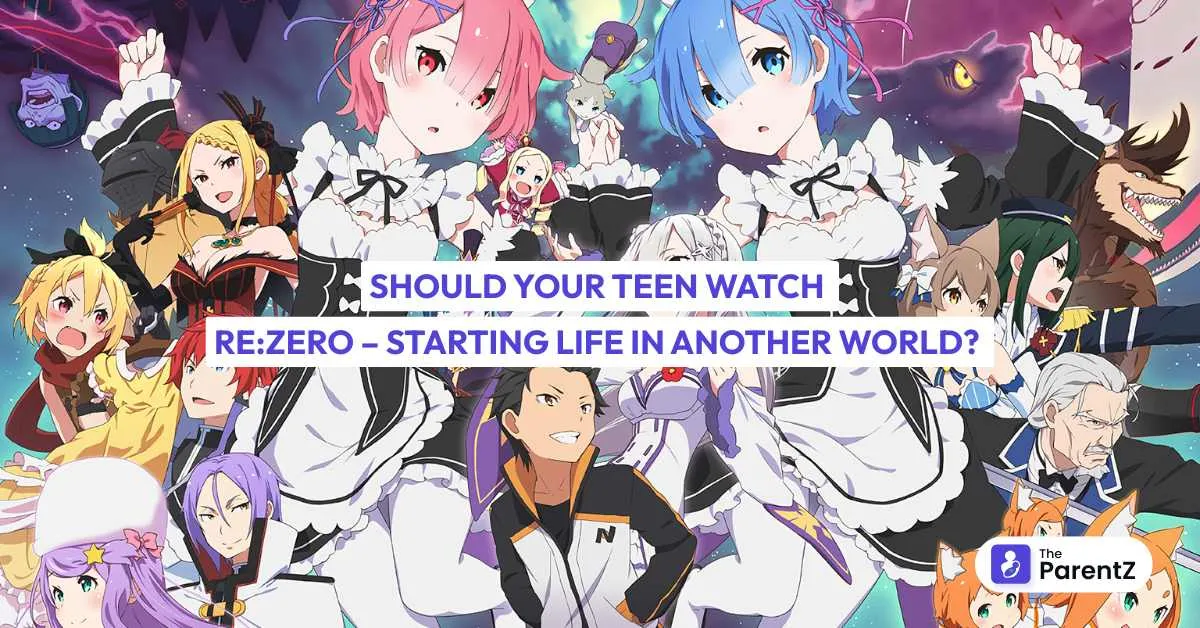Introduction
Re:Zero might look like just another fantasy anime at first glance—an ordinary boy gets transported to a magical world, meets a beautiful half-elf, gets caught up in adventures. Standard isekai setup, right?
Not quite.
This series quickly unravels into a psychological deep dive into death, trauma, and the terrifying toll of second chances. Beneath its fantasy tropes lies one of the most emotionally intense stories in anime today.
For teens, it can be gripping and relatable—but also distressing, especially if they’re unprepared for the sheer weight this show carries.
Overview
The story follows Subaru Natsuki, a modern-day teenager who is suddenly pulled into another world. No reason, no warning—he just ends up there. And within hours, he’s murdered.
Then he wakes up—back where he started.
This cycle repeats. Every time he dies, Subaru returns to a fixed point in the past. He remembers everything. The trauma. The mistakes. The people he couldn’t save.
With each reset, he tries to fix things—to save friends, to earn trust, to survive longer—but the psychological cost grows heavier with every failure.
What begins as a “fantasy quest” slowly becomes an emotional horror story about responsibility, loneliness, and self-worth.
Themes
1. Death, Trauma, and Psychological Deterioration
Subaru doesn’t just die. He dies brutally. Stabbings, beheadings, burns. And more than the physical pain, it’s the emotional scars that stay with him. He watches people he loves die—over and over—and the world forgets every time he resets.
The show doesn’t shy away from showing the mental breakdowns that follow. Subaru’s desperation, self-loathing, and fear are front and center.
For teens who’ve experienced trauma, anxiety, or intrusive thoughts, these scenes may feel painfully real—or dangerously triggering.
2. Identity and Validation
Subaru wants to be the hero. He wants to matter. But he’s not special—he has no powers, no swordsmanship, no noble background. He earns affection, trust, and forgiveness only through sheer effort—and that effort sometimes breaks him.
His relationship with Emilia, the main heroine, becomes less about love and more about his need to feel important. The show explores the toxic side of needing to be needed—a conversation worth having with teens navigating self-worth.
3. Rebuilding After Failure
Unlike other anime where characters “level up,” Subaru falls apart—emotionally, physically, mentally—before he learns anything. And the show makes you watch every moment of that process. It’s exhausting, but that’s also what makes it honest.
He fails. He learns. He tries again.
It’s not satisfying in a traditional narrative sense—but it’s deeply human.
Age Preference
Recommended for: 16+
While it’s not graphically sexual, Re:Zero includes intense violence, emotional trauma, scenes of torture, and long episodes focused on mental collapse. Teens must be mature enough to understand metaphor, emotional complexity, and the difference between self-pity and true growth.
Who Should Not Watch
- Viewers under 16
- Teens currently struggling with depression, suicidal ideation, or PTSD
- Anyone expecting light fantasy or romantic escapism
- Parents looking for empowering role models or uplifting arcs
This isn’t a feel-good story. It’s a raw depiction of what it means to fall apart—and to try rebuilding anyway.
Lessons From It
Re:Zero has real value, but you have to survive its darker layers to find it. It teaches that progress isn’t linear. That saving people isn’t about being perfect—it’s about being present. And that real strength doesn’t always look heroic. Sometimes, it’s just getting out of bed after failing the day before.
Subaru’s greatest growth doesn’t come from winning. It comes from learning to ask for help. To admit weakness. To stop treating other people’s approval as proof of his worth.
For teens navigating emotional complexity, this can be an invaluable message—if guided through it.
Conclusion
Re:Zero is a brutally honest portrayal of pain, growth, and redemption. It’s not for everyone. But for the right teen—with emotional support and open conversation—it can be an unexpectedly therapeutic watch.
If your teen wants to see it, don’t dismiss it. Ask them what they’ve heard. Offer to watch an episode or two with them. And most importantly, talk afterward—not just about the story, but about how it felt.
Because Re:Zero doesn’t just explore how you die. It asks something far more important: How do you live after?





Be the first one to comment on this story.